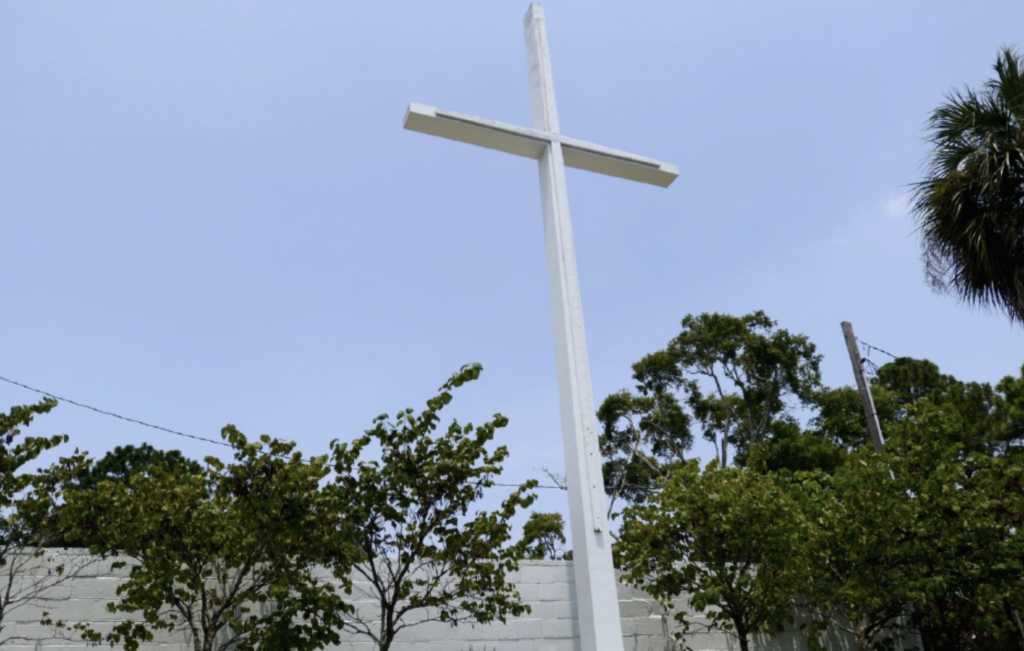Officials in Pensacola, Florida, are pushing back after a judge mandated this past summer that a large cross that has been on display in a public park for the past 76 years be taken down.
READ: Undeniable Proof That God Can Transform Even the Most Broken Lives
As Faithwire previously reported, the decision to remove the 34-foot cross inside Bayview Park came after Senior U.S. District Judge Roger Vinson ruled that its presence on public property is unconstitutional.
“The Bayview Cross can no longer stand as a permanent fixture on city-owned property,” the judge proclaimed, noting that he was well aware of the broad local support for keeping the cross in place. “The law is the law.”
But months later, the city of Pensacola has teamed up with Becket, a religious liberty law firm, to appeal that decision, with attorneys for the firm arguing that the cross — which has been on display in Pensacola’s Bayview Park since just before the U.S. entered World War II in 1941 — serves as “a symbol of the city’s history and culture.”
“Pensacola has a rich history, and it shouldn’t have to censor that history just because part of it is religious,” Luke Goodrich, deputy general counsel for Becket, said in a statement. “The constitution doesn’t treat religion like a nasty habit that must be hidden from public view; it treats it as a natural and valuable part of human culture. Pensacola can treat religion the same way.”
Our victory in Pensacola ruffled some feathers over at Fox. https://t.co/AK412Efx9R
— FFRF (@FFRF) June 19, 2017
The battle over the cross started after atheist groups sued in 2016 to seek its removal. The Freedom From Religion Foundation and the American Humanist Society decided to team up when it became evident that government officials wouldn’t bow down to activists’ removal demands.
The decision came down to the three-part legal precedent known as the “lemon test,” which states that a religious display must have a secular purpose, can’t advance religion and can’t “excessively entangle” the government with faith, the Journal noted.
Back in June, the FFRF called the impending removal a “big legal victory” and said in a press release that the legal battle was waged on behalf of “residents of Pensacola who objected to the cross on public property.”
Why is the cross an offense to atheists? Cause it says 'your a sinner' & 'repent of your sins of immorality' https://t.co/lVG6p4tOTg
— Ken Ham (@aigkenham) June 20, 2017
But the FFRF also noted that Vinson was reluctant in his June decision, claiming that judge disagreed with past Supreme Court rulings on the First Amendment and made some other proclamations that the atheist group said were “erroneous.”
“The historical record indicates that the Founding Fathers did not intend for the Establishment Clause to ban crosses and religious symbols from public property,” Vinson lectured.
At another point, TheBlaze reported that Vinson, an appointee of President Ronald Reagan, said he’d like to see the high court revisit some of these First Amendment decisions.
“Count me among those who hope the Supreme Court will one day revisit and reconsider its Establishment Clause jurisprudence, but my duty is to enforce the law as it now stands,” the judge said.
I hope Pensacola will appeal after Bayview Park cross ruled unconstitutional & ordered removed in 30 days https://t.co/qPzj4l0Zw3
— Marco Rubio (@marcorubio) June 20, 2017
Pensacola’s decision to appeal has likely elated some critics like Sen. Marco Rubio (R-Fla.), who took to Twitter over the summer to say that he hopes Pensacola appeals the ruling. It is unclear where the case will go next.



